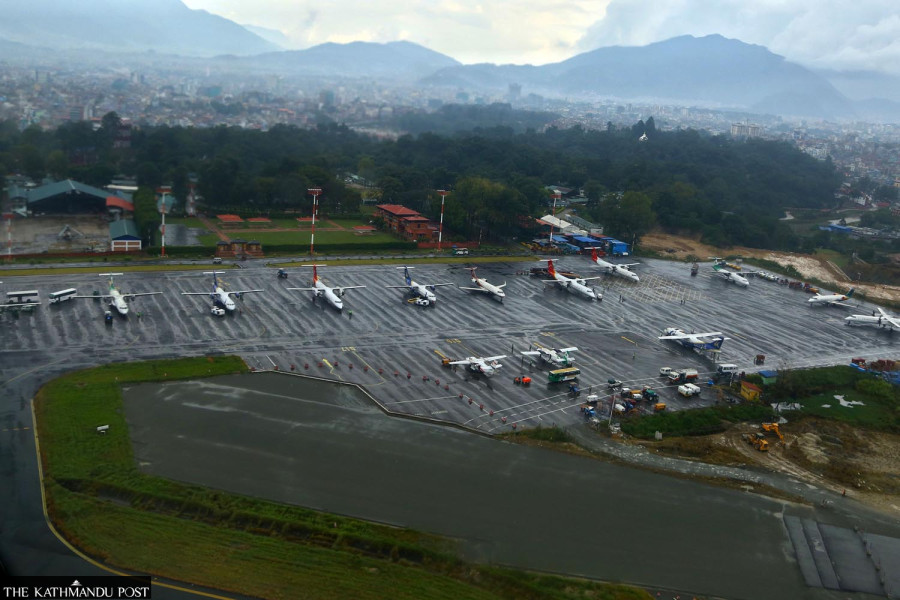Money
Cabinet committee approves civil aviation draft bills
The bills have long been pending, although they are vital to the safety of Nepali sky.
Sangam Prasain
The bill committee of the Cabinet has given a nod to the civil aviation bills two months after they were tabled, allowing the government to table the long-pending legislation in the winter session of Parliament.
According to a top official at the tourism ministry, the committee discussed the bills and suggested a few changes in wordings. “After the changes, the bills will be tabled in the Cabinet seeking its approval in principle to register them in the lower house of Parliament. Tabling the bills in the Cabinet after necessary amendments may take a few days.”
The then Pushpa Kamal Dahal-led government had put the bills into hibernation.
On September 6, after being halted by the Dahal administration for over a year, the draft civil aviation bills made into the KP Sharma Oli Cabinet’s agenda. Nepal’s two largest parties—the Nepali Congress and the CPN-UML—took decisive steps to split the country’s aviation body into two entities: service provider and regulator.
Since 2007, successive governments have proposed plans to end the regulator’s dual role. However, the bills have been languishing in obscurity, although they are vital to ensuring safe aviation in Nepal.
Passing the civil aviation bills would establish an independent regulator and remove Nepal from the European Commission’s air safety list, which has caused immense damage to Nepal’s tourism and put a spotlight on the country’s terrible aviation safety record. In December 2013, the European Commission banned all Nepali airlines from flying into the 28-nation bloc.
On October 21, addressing an international workshop on ‘EU-South Asia Aviation Partnership Project II Strengthening the partnership in aviation between the EU and South Asia’ held in Kathmandu, EU ambassador to Nepal Veronique Lorenzo said: “If the law is passed to split the Civil Aviation Authority of Nepal into a service provider and a regulatory body, the ban imposed on European skies 11 years ago can be removed.”
Tourism Minister Badri Prasad Pandey tabled the bills at the Cabinet on September 6 after the law and finance ministries approved their drafts.
When a bill is presented, the Cabinet approves the draft legislation and its introduction to Parliament.
Nepal has a terrible aviation safety record—eight crashes—six fatal ones—taking place over the past two and a half years, killing over 100 people.
Lawmakers have raised concerns about the government’s delay in implementing the new law, which aims to establish an independent civil aviation regulator.
The two long-pending aviation bills—the Civil Aviation Authority of Nepal Bill and the Air Service Authority of Nepal Bill—propose splitting Nepal’s aviation body into two entities, a condition for Nepal to be struck off the European Commission’s air safety list.
Tourism ministry officials say this is the fourth time they have sent the bills to the Cabinet since they were passed by the upper house in 2021. But every time, the government changes, and the bills return.
On July 16, 2023, two months before the European Union Aviation Safety Agency (EASA), the European authority for aviation safety, planned a safety audit of Nepal’s aviation system, the tourism ministry sent the draft bills to the Cabinet, seeking its ‘approval in principle’ to table them in Parliament.
On August 2, 2021, the upper house unanimously passed the two aviation bills, which had been languishing for a year and a half as political squabbling engulfed the country. They were registered on February 23, 2020.
The 15th Joint Commission meeting of the European Union held in Kathmandu on March 19 this year underlined that air safety remains a key priority in their bilateral relations.
In 2022, in its final audit report, the United Nations aviation watchdog ICAO formally asked Nepal to split the civil aviation body into two entities.
Several aviation watchdogs, experts, and diplomatic agencies have urged Nepal to strengthen its independent regulatory body to ensure safer skies.
The government first announced the proposal in its Three Year Interim Plan (2007-08 to 2009-10), which stated, “In the context of the completion of the study on the institutional strengthening of the Civil Aviation Authority of Nepal (CAAN), which has been working as the service provider in civil aviation, airport operator and regulator; implementation of doable recommendations suggested by the report is being considered.”
Since then, every periodic plan and policy, including the annual budget, has prioritised separating the civil aviation body. But the plan has yet to be implemented.




 10.12°C Kathmandu
10.12°C Kathmandu














